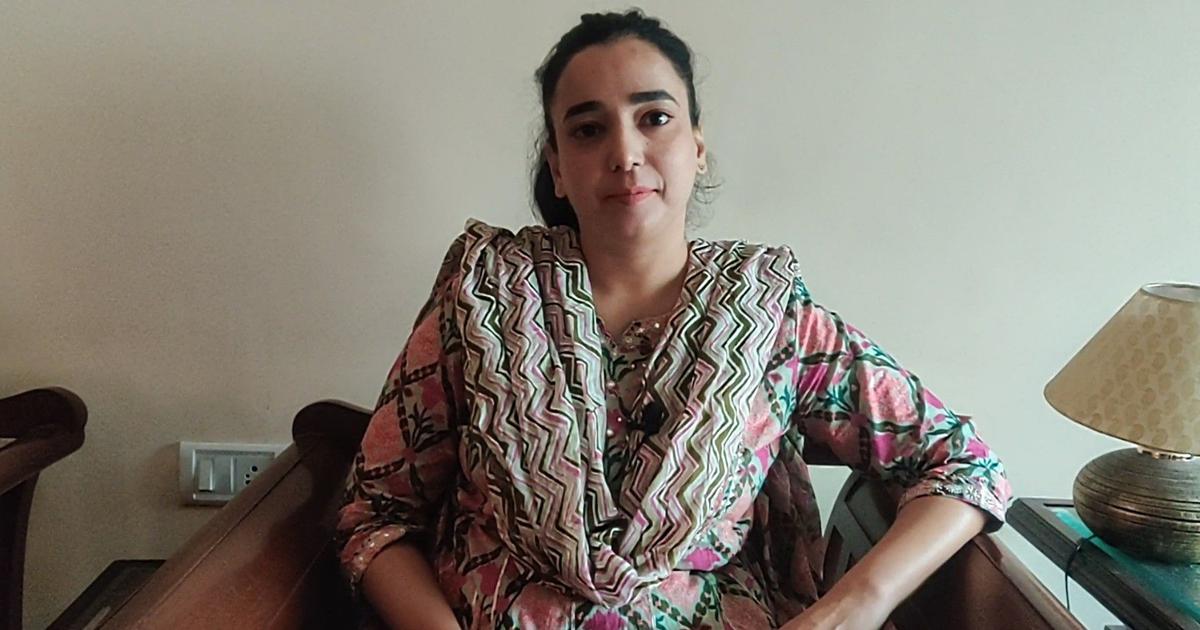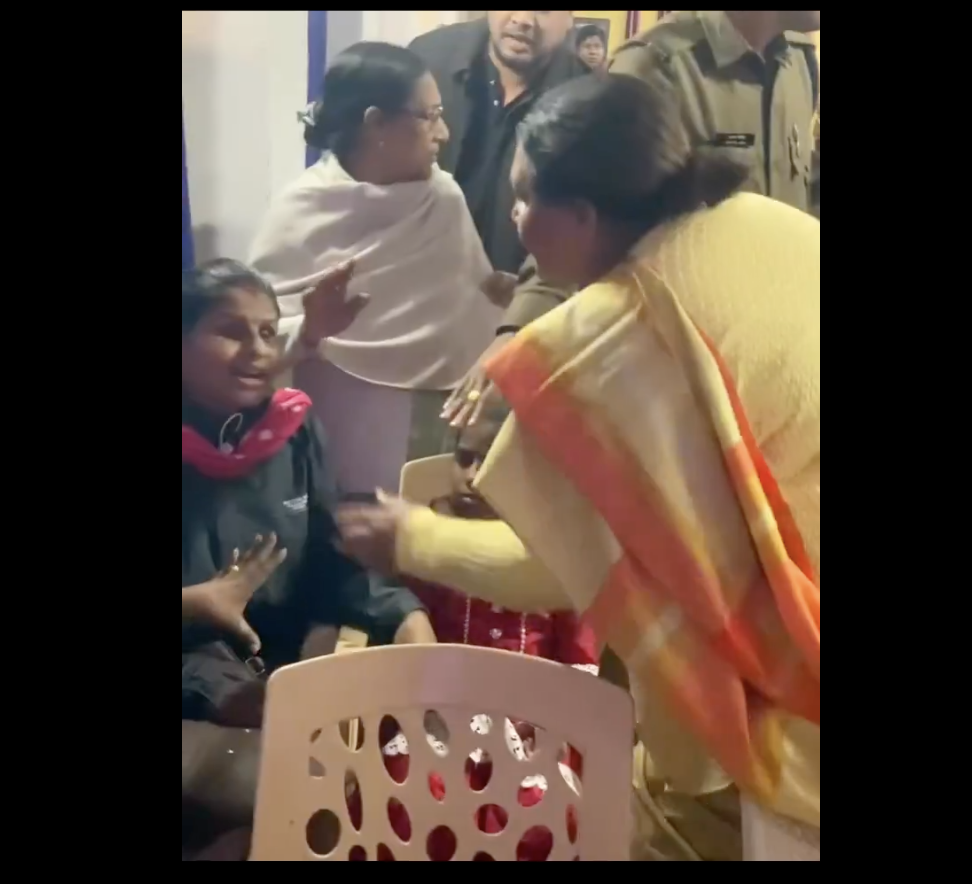
By Aishwarya Iyer / Scroll
Locked up in barrack 16 of Delhi’s Mandoli jail, Ishrat Jahan would leave traces of herself in a diary. She would write down her thoughts, what she had done that day, what her family was doing, fragments of poetry.
Not everything could be written down. Jahan, a former Congress councillor, was booked under the Unlawful Activities (Prevention) Act, a stringent anti-terror law, for her alleged role in the communal violence that broke out in North East Delhi in February 2020. Her cell would be subjected to surprise checks and who knew if her thoughts were allowed?
“So I’d write some words, some clues, to remind myself of what I was really thinking and feeling,” Jahan said. When she wrote, she told herself that if she was to read this diary two years later, she would see how she grew stronger with each page.
On March 15, two years after she was imprisoned, Jahan was granted bail by Delhi’s Karkardooma sessions court. A pandemic and other upheavals have swept through the country since she was last free.
“I feel there is a difference in the world,” said the 31-year-old. “There seem to be a lot of changes, socially and politically. I’ll take some time to understand this. People from my constituency, those who support me and care about me, are scared of expressing themselves or contacting me openly.”
FIR 59
Jahan was first arrested from North East Delhi’s Khureji Khas on February 26, 2020, for her part in protests against the Citizenship (Amendment) Act. The law introduced a religious criteria for Indian citizenship. While some criticised it for violating the constitutional principle of secularism, many Muslims feared the law was a step towards stripping them of Indian citizenship.
Days before Jahan’s arrest, the protests had triggered a backlash from Hindu rightwing supporters, and communal violence had engulfed North East Delhi. The rioting left 53 dead, of whom 38 were Muslim. Over 750 first information reports were registered and thousands have been arrested.
Jahan was first arrested under FIR 44 for allegedly provoking crowds at the protest site in Khureji Khas and urging them to stay on as the violence spread. She got bail on March 21, 2020, but was rearrested the same day as she had been named in FIR 59, which famously accused 21 people of conspiring to foment communal violence in Delhi and destabilise the state.
She never understood why she was booked under the UAPA and was often unable to follow proceedings in the conspiracy case from jail. Several articles were cut out of the newspapers that reached them. News channels were not played on the television in jail. “It only had some music, movies and Hindu bhakti channels,” she said.
Most often, she caught up with what was happening during virtual court hearings – because of the pandemic, in-person appearances had been suspended for nearly two years. Jahan said she did not know any of the people she was alleged to have conspired with. Others accused in FIR 59 included student activists Umar Khalid, Gulfisha Fatima, Devangana Kalita and Natasha Narwal.
“I met Gulfisha in the judicial lock-up one year later and Umar Khalid introduced himself to me in court,” she said. “It was so odd because we were told we are co-accused, co-conspirators, but we were introducing ourselves to each other in court.”
Of all the accused, six have been granted bail by the high court. Jahan is the only one who has been granted bail by the lower court, a rare occurrence for someone charged under Sections 17 (terror funding) and 18 (conspiracy) of the UAPA.
In its bail order, the court said there was nothing in the chargesheet to prove she had been physically present during the Delhi violence, nor was she a member of any WhatsApp group that had allegedly planned the conspiracy.
“Even now I feel that a system framed me wrongly, but the judiciary appreciated my case,” Jahan said.
When she heard that she had been granted bail, she started shivering. On March 16, she left Mandoli jail, hand in hand with her husband, whom she had married when she was briefly out on interim bail in June 2021. Hundreds had gathered to greet her back home, she said. Not just friends and family but also her former constituents. About 25 months of conversation was had in one night, said Jahan, smiling.
Those 25 months have left physical traces. Days after being released from jail, Jahan was still unable to eat solid food – her appetite had waxed and waned in prison, where she often refused the miserable fare. She has developed high blood pressure and thyroid problems, the left part of her body often goes numb.
She wants to go back to being the “Ishrat” she was. But those 25 months were filled with experiences that tore her away from the person she was.
In police custody
After she was rearrested on March 21, 2020, Jahan spent 15 days in the custody of the Delhi Police special cell.
“Other than physical violence, everything happened during police custody,” said Jahan. She claims she was interrogated constantly. “They want you to get angry and say something. I would have to distract them or concentrate on keeping my cool. I would tell them I wanted to go offer namaz.”
The interrogation could start at odd hours. “Sometimes they would come [into my cell] at 11:00 at night and say, ‘Ishrat, listen, if you remember anything, tell us’,” Jahan recounted. “They would also take me for questioning then.” she said. However, a female police official was always present with the main interrogating officer.
Jahan claims she was under immense pressure to name other people involved in the alleged conspiracy but she did not. Even though she met her family and her lawyer every day, she was always accompanied by four police officers. “It was as good as not being able to talk to them [her family and lawyers],” she said.
When she was transferred to Mandoli jail in April 2020, Jahan knew she had a long fight ahead of her.
Under the halogen glare
Jahan said that when she left Mandoli on March 16, she insisted on meeting the jail superintendent. “I wanted her blessings as this would be a chapter of my life and I wanted to leave cordially,” she said.
Things were not always cordial between Jahan and the jail authorities. She remembers the shock of her first search in jail. She also claims she was kept in solitary confinement for 15 days. “I was very scared then,” Jahan said. “I was kept in one of the small cells; all the other cells on that floor were empty. There were strong halogen lights that would give me eye strain. Someone would give food and go.”
That was the time she relied on conversations with herself and on writing in her diary.
Jahan remembers how the constant anxiety made her develop a nosebleed in August 2020. Her lawyers often moved court saying she was being targeted by other inmates in jail. In December 2020, for instance, her lawyers moved court after she was beaten and abused by other inmates in her cell. The application filed in court stated that her clothes had been torn and her life was at risk.
After the Karkardooma court heard the matter on December 22, 2020, Justice Amitabh Rawat had asked the jail authorities for a status report the next day. This did not help matters with the jail authorities. “The equation would keep getting tense,” Jahan recounted.
But when she finally left on March 16, Jahan said, members of the administration wished her well.
Saving graces
There were saving graces in jail. While some inmates attacked her, Jahan also made friends.
As she packed to leave, she gave away most of her things. “I gave some clothes to a Brazilian inmate who has no representation,” she said. “I gave my scarf to another woman who asked for it. I only brought my diaries and books back with me.”
When she left, her friends in prison put mehendi on her feet. It was to complete a wedding ritual that had been left unfinished in June 2021.
“When I returned to jail after my interim bail, which was when I got married, I still had mehendi on my hands and feet,” Jahan explained. While the wedding could take place, the vidai – the ritual where the bride leaves her parents’ home for her married home – had to be put on hold. “They put mehendi on me so that my family, and especially my husband, would be surprised.”
‘The Ishrat I was’
After leaving Mandoli jail, Jahan has been living in her mother’s house. She will stay there until the vidai ceremony is held and she goes to her new home. There, she will begin to pick up the pieces of her old life.
In that life, Jahan had been a graduate in political science and studied law. She wanted to be a judge but she put that plan on hold to enter politics. Her father, Naeem Ahmed, who died in 2010, had been a long time supporter of the Congress. “He got me a car, taught me how to drive, encouraged me to study and practise law,” she said.
Jahan was the first person in her family to formally join politics. In 2012, she won East Delhi’s Ghondli municipal constituency on a Congress ticket.
When relatives went to visit her in prison, Jahan put on make-up and a brave face to meet them. And they did not tell her that two people in her family had died of Covid-19 while she was in prison. “They cared about me so much that they did not want me to get worried. I only got to know now,” she said.
Jahan said the hardships of prison have made her a stronger person. She is no longer afraid to sleep alone or bothered by mosquitoes. “You know, we take a lot of things for granted – food and clothes – My time in jail made me realise that,” she said.
The case will still take up time, which means her dream of writing judicial examinations and becoming a judge has receded further. For the time being, Jahan wants to go back to working as a lawyer, focusing on criminal and matrimonial matters. Her family, who suffered greatly when she was in prison, will be a priority
But those two lost years will not be forgotten soon. Jahan hopes to turn her prison diaries into a book someday.
This article first appeared on scroll.in






